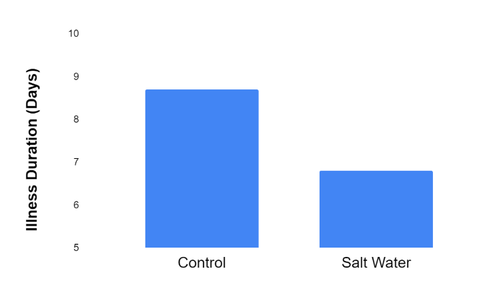|
We might have a safe, effective treatment for viral respiratory infections right under our noses. A 2019 study from one of the world’s top scientific journals showed that nasal irrigation and gargling with salt water may help fight viral respiratory infections - including those caused by coronaviruses. The method is safe and simple: if you have a respiratory infection, snort and gargle a solution of salt water a few times per day. Their website explains how to do it, and the gist of it is:
Participants in this study who irrigated their sinuses with the salt water had about 2 fewer days of illness (see the graph below), seemed to be less likely to infect others in the house, and seemed to be shedding fewer viruses from their noses. So why does irrigating noses with salt water help stop viral respiratory infections?
We don’t know all the details yet, but it looks like our cells can use the salt ions to make hypochlorous acid, the active ingredient in bleach. That means by snorting salt water, you might be helping your cells make their own equivalent of natural bleach to disinfect your sinuses. Now, the authors are quick to point out that this was a smaller study (around 60 people), and so can't be used to definitively prove how well this works, especially for any one kind of virus. That being said, the overall treatment effects were statistically significant, and other studies (also here and here) have also found significant benefits from salt water irrigation for respiratory infections. It definitely looks like there is something to this. THE TAKE HOME: Salt water washes are a safe, natural, and inexpensive tool that might help our cells fight off viral infection. Definitely worth talking to your doctor about.
0 Comments
Leave a Reply. |
about the authorSJadon Webb, M.D., Ph.D.
Owner Bloom Mental Health Shannon Keane,
MSN, FNP-C, PMHNP-BC Clinical Director Disclaimer: this blog is NOT intended as medical advice and does not imply any kind of specific guidance or treatment recommendations, and should NOT be used to guide a treatment protocol. (read full disclaimer)
Afton Williamson,
DNP, MSN, FNP-BC Family Nurse Practitioner |
Location |
|





